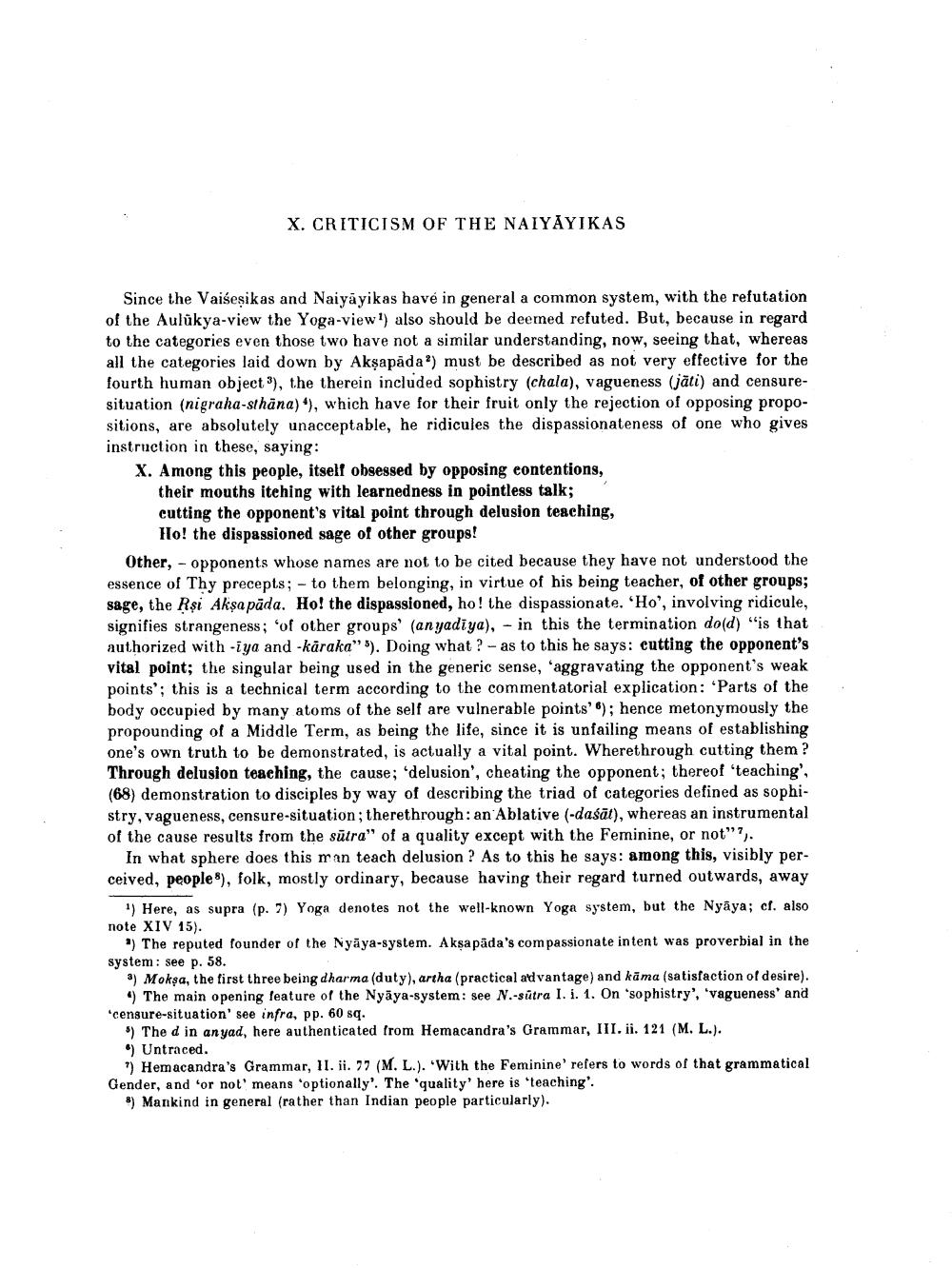________________
X. CRITICISM OF THE NAIYAYIKAS
Since the Vaisesikas and Naiyáyikas have in general a common system, with the refutation of the Aulükya-view the Yoga-view?) also should be deemed refuted. But, because in regard to the categories even those two have not a similar understanding, now, seeing that, whereas all the categories laid down by Akşapāda) must be described as not very effective for the fourth human object"), the therein included sophistry (chala), vagueness (jäti) and censuresituation (nigraha-sthāna)"), which have for their fruit only the rejection of opposing propositions, are absolutely unacceptable, he ridicules the dispassionateness of one who gives instruction in these, saying: X. Among this people, itself obsessed by opposing contentions,
their mouths itehing with learnedness in pointless talk; cutting the opponent's vital point through delusion teaching,
Ho! the dispassioned sage of other groups! Other, - opponents whose names are not to be cited because they have not understood the essence of Thy precepts; - to them belonging, in virtue of his being teacher, of other groups; sage, the Rşi Aksa päda. Ho! the dispassioned, ho! the dispassionate. 'Ho', involving ridicule, signifies strangeness; 'of other groups' (an yadiya), - in this the termination do(d) "is that authorized with -iya and -käraka"). Doing what ? - as to this he says: cutting the opponent's vital point; the singular being used in the generic sense, 'aggravating the opponent's weak points'; this is a technical term according to the commentatorial explication: "Parts of the body occupied by many atoms of the self are vulnerable points' ); hence metonymously the propounding of a Middle Term, as being the life, since it is unfailing means of establishing one's own truth to be demonstrated, is actually a vital point. Wherethrough cutting them ? Through delusion teaching, the cause; 'delusion', cheating the opponent; thereof 'teaching, (68) demonstration to disciples by way of describing the triad of categories defined as sophistry, vagueness, censure-situation; therethrough: an Ablative (-dasät), whereas an instrumental of the cause results from the sūtra" of a quality except with the Feminine, or not"?).
In what sphere does this man teach delusion? As to this he says: among this, visibly perceived, people), folk, mostly ordinary, because having their regard turned outwards, away
1) Here, as supra (p. 7) Yoga denotes not the well-known Yoga system, but the Nyāya; cf. also note XIV 15).
a) The reputed founder of the Nyāya-system. Aksa pāda's compassionate intent was proverbial in the system: see p. 58.
a) Mokşa, the first three being dharma (duty), artha (practical advantage) and käma (satisfaction of desire).
9 The main opening feature of the Nyāya-system: see N.-sūtra 1. i. 1. On 'sophistry', 'vagueness and 'censure-situation' see infra, pp. 60 sq.
9 The d in anyad, here authenticated from Hemacandra's Grammar, III. ii. 121 (M. L.). 4) Untraced.
) Hemacandra's Grammar, 11. ii. 77 (M. L.). With the Feminine' refers to words of that grammatical Gender, and 'or not means 'optionally. The 'quality' here is teaching'.
) Mankind in general (rather than Indian people particularly).




